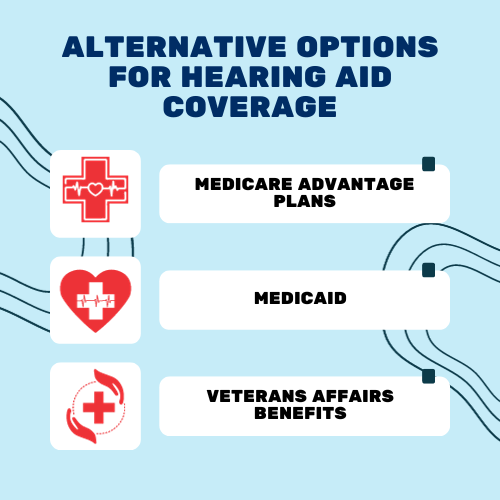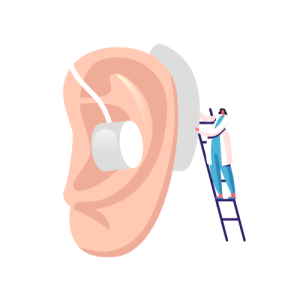
by Russell Noga | Updated November 27th, 2023
Does Medicare Plan N Cover Hearing Aids?
Hearing aids can significantly improve the quality of life for individuals with hearing loss, but finding coverage for these essential devices can be challenging. Are you wondering, “Does Medicare Plan N cover hearing aids?”
This comprehensive guide will walk you through everything you need to know about Medicare Plan N, alternative options for hearing aid coverage, costs, and how to select the right plan for your hearing needs.
Short Summary
- Medicare Plan N does not cover hearing aids, but there are alternative options available.
- Explore coverage options such as Medicare Advantage plans, Medicaid and Veterans Affairs benefits to help offset the cost of hearing aids.
- Consider factors like star rating, coverage levels and premiums when selecting a plan for your individual needs.
Understanding Medicare Plan N
 Medicare Plan N is a supplemental insurance plan that helps cover costs not covered by Original Medicare, such as copayments, coinsurance, and deductibles.
Medicare Plan N is a supplemental insurance plan that helps cover costs not covered by Original Medicare, such as copayments, coinsurance, and deductibles.
Hearing aids are not provided by Medicare. This does not change, regardless of the circumstances.
So, what options do you have for hearing aids covered by your hearing aid coverage, and how does it relate to your overall hearing coverage?
What is Medicare Plan N?
Medicare Plan N is a Medigap policy designed to help fill gaps in Original Medicare coverage. It offers coinsurance for hospital stays, skilled nursing facility care, and Part B excess charges, but does not include coverage for Part B deductibles, Part A hospice care coinsurance, or Part B preventive care coinsurance.
This policy is a great option for those who want to supplement their Original Medicare coverage but don’t have it.
Coverage under Medicare Plan N
While Medicare Plan N provides coverage for various healthcare expenses, it does not cover hearing aids. This lack of coverage leaves beneficiaries responsible for the full cost of these essential devices, which can be quite substantial.
Thankfully, there are alternative options for hearing aid coverage, such as Medicare Advantage plans, Medicaid, and Veterans Affairs benefits. Let’s explore these options further to help you make an informed decision about your hearing aid coverage.
View Rates for 2024
Enter Zip Code
Does Medicare Plan N Cover Hearing Aids?
Unfortunately, Medicare Plan N does not cover hearing aids or fitting exams. This means that beneficiaries will have to bear the full cost of hearing aids, which can range from hundreds to thousands of dollars. Furthermore, Medicare Plan N does not cover hearing exams, leaving you responsible for these costs as well.
However, all hope is not lost. There are alternative options for hearing aid coverage that can help offset the costs of these essential devices. Let’s take a closer look at these alternatives, such as Medicare Advantage plans, Medicaid, and Veterans Affairs benefits.
Limitations of Medicare Plan N
One of the primary limitations of Medicare Plan N is its lack of coverage for hearing aids, eyeglasses, and dental care. These items are considered more affordable healthcare options and are not included in Original Medicare. As a result, beneficiaries must find alternative coverage options or bear the full cost of these services.
The good news is that there are alternative options available for hearing aid coverage, such as Medicare Advantage plans, Medicaid, and Veterans Affairs benefits.
These options can provide hearing aid benefits, including coverage for hearing aids and other associated hearing services, helping to ease the financial burden for beneficiaries.
Alternative Options for Hearing Aid Coverage
If you’re looking for hearing aid coverage, don’t despair. There are several alternative options available, including:
- Medicare Advantage plans,
- Medicaid,
- and Veterans Affairs benefits.

Each of these options has its own set of advantages and criteria for coverage, so it’s essential to explore each one to find the best fit for your individual needs.
Doing your research and understanding the different coverage options available can help you make an informed decision.
Medicare Advantage Plans
Medicare Advantage plans, commonly known as Medicare Part C, offer coverage for hearing exams and hearing aids. These benefits are not typically included with Original Medicare. These plans are offered by private insurance companies and can provide additional coverage for vision, hearing, and dental services.
However, it’s crucial to note that coverage for hearing aids and exams varies depending on the specific Medicare Advantage plan. It’s essential to review the ‘Evidence of Coverage’ for each plan to gain an understanding of the specific benefits and costs associated with hearing aid coverage.
Medicaid and Hearing Aids
Medicaid is a health care coverage program for eligible low-income adults, children, older adults, pregnant individuals, and people with disabilities. It is administered by each state, in accordance with federal requirements, based on need. Medicaid may provide coverage for hearing aids for qualified individuals; however, coverage is contingent on the state and its eligibility criteria.
To determine if you qualify for hearing aid coverage with Medicaid, visit medicaid.gov. You can also apply for coverage on the same website. Keep in mind that each state has its own rules and regulations when it comes to hearing aid coverage, so it’s essential to research your specific state’s requirements.
Veterans Affairs Benefits
If you’re a veteran, you may be eligible for hearing aid coverage through the Veterans Affairs benefits program. The Department of Veterans Affairs offers a variety of benefits, such as:
- Disability compensation
- Pension
- Education and training
- Health care
- Home loans
- Insurance
- Veteran Readiness and Employment
- Burial
Eligible veterans can receive coverage for hearing aids through this program, providing much-needed financial relief.
Hearing Aid Costs and Financial Assistance
The average cost of hearing aids is around $2,500, which can be a significant expense for many individuals. However, there are financial assistance programs available to help offset these costs.
Let’s explore the average costs of hearing aids and the financial assistance options available.
Average Cost of Hearing Aids
 The typical hearing aids cost varies depending on the type and features of the device, with prices ranging from $700 for basic models to several thousand dollars for more advanced options.
The typical hearing aids cost varies depending on the type and features of the device, with prices ranging from $700 for basic models to several thousand dollars for more advanced options.
For those enrolled in Original Medicare or Medicaid, the expense for a hearing aid is typically around $2,300 each, payable in full.
Fortunately, there are financial assistance programs available to help with the cost of hearing aids. Some of these programs include:
- Discount programs
- Retail stores
- Charities
- The VA
It’s essential to research and explore these options to find the best fit for your financial and hearing needs.
Financial Assistance Programs
Various financial assistance programs are available to help with the cost of hearing aids, such as Medicaid, Medicare Advantage plans, and Veterans Affairs benefits.
The application process for these programs may vary depending on the specific program, but generally, you would need to provide proof of income, residency, and other relevant documents.
If you’re unsure about your eligibility for financial assistance or need additional information, you can visit your local Social Security office, the Centers for Medicare and Medicaid Services, or other government websites for further guidance. With the right resources, you can find the financial assistance you need to obtain the hearing aids you require.
Hearing Tests and Medicare Coverage
Original Medicare covers diagnostic hearing tests if recommended by a doctor, while Medicare Advantage plans may offer more comprehensive hearing test coverage.
It’s important to understand the differences between these plans when it comes to hearing tests and exams.
Original Medicare and Hearing Tests
Original Medicare does not provide coverage for hearing tests. This means that beneficiaries are responsible for the full cost of these exams unless they have additional coverage through a Medicare Advantage plan or other supplemental insurance.
These plans may cover some or all of the cost of a hearing test, depending on the plan.
Medicare Advantage and Hearing Tests
Medicare Advantage plans, on the other hand, typically include coverage for hearing tests and exams. However, it’s important to verify coverage levels with your plan to understand the extent of coverage for hearing tests under Medicare Advantage plans.
Additionally, you can explore alternative options such as Medicaid and Veterans Affairs benefits, as well as financial assistance programs, for additional hearing test coverage.
Selecting the Right Medicare Plan for Your Hearing Needs
Choosing the right Medicare plan for your hearing needs can be a daunting task. It’s crucial to compare Medicare Advantage plans and consider supplemental insurance options to ensure you have the coverage you need for hearing aids and exams.
When comparing plans, consider the cost of premiums, deductibles, and copays.

Comparing Medicare Advantage Plans
When comparing most Medicare Advantage plans, it’s important to consider factors such as:
- Star rating
- Coverage
- Cost
- Provider network
- Prescription drugs
- Plan types
One crucial aspect to focus on is the hearing aid coverage offered by each plan, as this can vary significantly between plans.
After comparing various plans based on these criteria, you should select the plan that best meets your hearing needs and financial requirements. Ensuring you have the right coverage can help alleviate the burden of hearing aid costs and provide you with the hearing support you need.
Considering Supplemental Insurance
In addition to Medicare Advantage plans, you may also want to consider supplemental insurance options that provide additional hearing aid coverage for Medicare beneficiaries.
These policies can offer extra coverage for deductibles, copayments, and services not covered by Medicare, including Medicare cover hearing aids, providing additional financial protection in the event of an unexpected medical expense.
Supplemental insurance policies can be tailored to meet the needs of individual Medicare beneficiaries, allowing them to receive benefits.
Summary
In conclusion, while Medicare Plan N does not cover hearing aids, there are alternative options available for coverage, such as Medicare Advantage plans, Medicaid, and Veterans Affairs benefits.
By comparing plans, considering supplemental insurance options, and exploring financial assistance programs, you can find the right solution to meet your hearing needs. Remember, investing in your hearing health is crucial to maintaining your overall well-being and quality of life.
Get Quotes For Medicare Plan N
Enter Zip Code
Frequently Asked Questions
Does any part of Medicare cover hearing aids?
Original Medicare (Parts A and B) does not cover hearing aids, but some Medicare Advantage plans may offer extra benefits that include coverage for hearing aids.
Diagnostic hearing and balance exams may be covered by Medicare Part B, and some Medicare Supplement plans provide coverage for hearing care, including hearing aids.
Do Medicare Advantage plans cover hearing aids?
Medicare Advantage (Part C) plans may offer some coverage for hearing aids, depending on your plan. Therefore, Medicare Advantage plans can potentially provide coverage for hearing aids and exams with no hidden costs.
How often can you get hearing aids with Medicare?
Medicare typically limits enrollees to one set of hearing aids per year, although some plans may restrict coverage to one pair every two years.
What are some alternative options for hearing aid coverage?
Alternative options for hearing aid coverage include Medicare Advantage plans, Medicaid, and Veterans Affairs benefits. Each of these can help offset the costs associated with hearing aids.
Does Original Medicare cover hearing tests?
Yes, Original Medicare does cover hearing tests if they are recommended by a doctor.
Find the Right Medicare Plan for You
Finding the right Medicare Plan 2024 doesn’t have to be confusing. Whether it’s a Medigap plan, or you want to know if Medicare Plan N covers hearing aids, we can help.
Call us today at 1-888-891-0229 and one of our knowledgeable, licensed insurance agents will be happy to assist you!

Russell Noga is the CEO and Medicare editor of Medisupps.com. His 15 years of experience in the Medicare insurance market includes being a licensed Medicare insurance broker in all 50 states. He is frequently featured as a featured as a keynote Medicare event speaker, has authored hundreds of Medicare content pages, and hosts the very popular Medisupps.com Medicare Youtube channel. His expertise includes Medicare, Medigap insurance, Medicare Advantage plans, and Medicare Part D.


